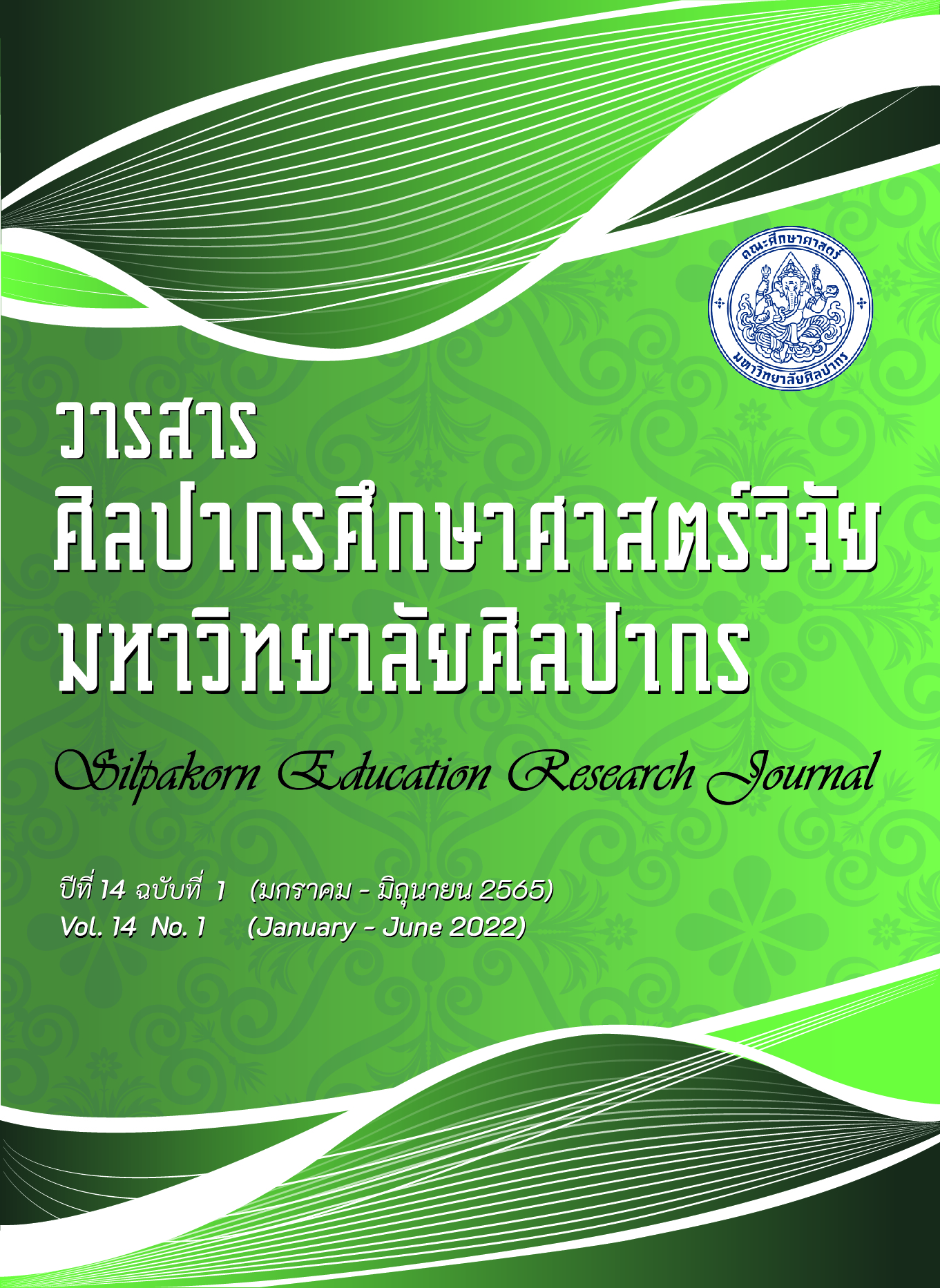การพัฒนากิจกรรมการเรียนรู้เกมดิจิทัล (Digital Game Classroom) โดยใช้ชุมชนเป็นฐาน เพื่อส่งเสริมผลการเรียนรู้หลักการออกแบบการสร้างสรรค์เรขศิลป์ ของนักศึกษาระดับปริญญาตรี สาขาวิชาศิลปศึกษา
คำสำคัญ:
เกมเพื่อการศึกษา, การออกแบบเรขศิลป์, ชุมชนเป็นฐานบทคัดย่อ
การวิจัยในครั้งนี้มีวัตถุประสงค์ ดังนี้ 1) เพื่อพัฒนาและศึกษาผลการออกแบบกิจกรรมการเรียนรู้ เกมดิจิทัลโดยใช้ชุมชนเป็นฐาน ของนักศึกษาระดับปริญญาตรี สาขาวิชาศิลปศึกษา 2) เพื่อศึกษาผลการออกแบบสร้างสรรค์เรขศิลป์ของนักศึกษาระดับปริญญาตรี สาขาวิชาศิลปศึกษา 3) เพื่อศึกษาความพึงพอใจของผู้เรียนที่มีต่อการเรียนรู้เกมดิจิทัลและการออกแบบเรขศิลป์ ประชากรที่ใช้ในการวิจัย คือ นักศึกษามหาวิทยาลัยศิลปากร สาขาวิชาศิลปศึกษา คณะศึกษาศาสตร์ ภาคเรียนที่ 2 ปีการศึกษา 2563 จำนวน 47 คน เครื่องมือที่ใช้ในการรวบรวมข้อมูลมี 6 แบบ สถิติที่ใช้ในการวิเคราะห์ข้อมูล ได้แก่ หาค่าดัชนีความสอดคล้อง, ค่าเฉลี่ยและส่วนเบี่ยงเบนมาตรฐาน ผลการวิจัยนอกจากได้ข้อมูลการสัมภาษณ์แนวคิด 4 ด้านแล้ว ยังพบว่า ผลประเมินการถอดบทเรียนของนักศึกษา 9 กลุ่ม (เกณฑ์การให้คะแนน Rubric Score) ได้คะแนนเฉลี่ย = 10.78 อยู่ในระดับดีมาก, ผลการประเมินคุณภาพความเหมาะสมของคู่มือการใช้กิจกรรมการเรียนรู้เกมดิจิทัล ได้ค่าเฉลี่ย = 4.50 ส่วนเบี่ยงเบนมาตรฐาน = 0.49 หมายถึง คู่มือฯ มีความเหมาะสมในระดับมากที่สุด, ผลการประเมินการออกแบบกิจกรรมการเรียนรู้เกมดิจิทัลโดยผู้สอน (เกณฑ์การให้คะแนน Rubric Score) ผลการประเมินภาพรวม ได้ค่าเฉลี่ย = 12.89 หมายถึง อยู่ในระดับดี, ผลการออกแบบสร้างสรรค์เรขศิลป์ของนักศึกษา ประเมินโดยผู้แทนชุมชน จำนวน 3 ท่าน ผลการประเมินภาพรวมได้ค่าเฉลี่ย = 4.24, ส่วนเบี่ยงเบนมาตรฐาน = 0.51 หมายถึง ผลงานภาพรวมอยู่ในระดับดี, และประเมินโดยผู้สอน (เกณฑ์การให้คะแนน Rubric Score) ผลการประเมินภาพรวมได้คะแนนค่าเฉลี่ย = 13.56 หมายถึง ผลงานอยู่ในระดับดีมาก, ผลการประเมินความพึงพอใจของผู้เรียนที่มีต่อ
เอกสารอ้างอิง
Betz, J.A. (1995). Computer game: Increase Learning and Thinking in an Interactive Multidisciplinary Enviroment.[Online].Retrieved April 9, 2021 from http://www.fact.suny.edu/ cit95/bstract.html.
Ching-Hsue Cheng and Chung-Ho Su. (2011). A Game-based Learning System for Improving Student’s Learning Effectiveness in System Analysis Course. Procedia-Social and Behavioral Sciences 31(2012): 669–675.
Davis, M. (2018). Graphic Design Theory. 2nd ed. London: Thames and Hadson.
Faculty of Education and Faculty of Arts, Silpakorn University. (2019). "Details of the Program (Programme Specification) Bachelor of Education Program in Arts (4 years). Nakhon Pathom: Copy Document. (In Thai)
Gaidcharoen, T. (2016). Smart Farm. [Online]. Retrieved April 9, 2021, from http://smartfarm
thailand. com/ precisionfarming/ index.php/product/micro- climate-monitoring/83-smart-farm. (in Thai).
Hough, B., and Duncan, K. (1970). Teaching Description and Analysis. Boston: Addison-Westlu. Cited in Wongkitrungruang, W. (2013). Digital Citizen's Guide. Bangkok: Digital Economy Promotion Agency Ministry of Digital Economy and Society. (in Thai)
Jadnalao, A. (2021). Dean's Teacher Faculty of Decorating Arts, Silpakorn University. Interview, March 6, 2021. (in Thai).
Kobayashi, S. (1991). Colorist A Practical Handbook for Personal and Professional Use. Tokyo: Bunkyo-ku.
Kolaka, K. (2007). Community Development Project Lesson Guide. Bangkok: Department of Community Development. (in Thai).
Kwanchian, N. (2021). What is Games Based Learning or GBL. [Online] March 20, 2021. from https://www. trueplookpanya.com/blog/content/84436/-blog-teamet-. (in Thai)
Laurajvi, S. (2015). Peace Method 1. Bangkok: Very Good Selection. (in Thai).
Leekitwattana, P. (2010). Educational Research. 5 th ed., Bangkok: Faculty of Industrial Education. King Mongkut's Institute of Technology Ladkrabang. (in Thai).
Mindshare Agency. (2014). Deeper Knowing the Fact That Digital Natives Consume New Breeds. Marketers Need to Know. [Online]. Retrieved September 2, 2020, from
https://www.brandbuffet.in.th/2014/03/digital-natives-mindshare-research/. (in Thai).
Mulkham, S., and Mulkham, O. (2004). Learning Management by Group Process. 5 th ed., Bangkok: Prints. (in Thai).
Nottingham, A., and Stout, J. (2019). The Graphic Design Process: How to be Successful in Design School. New York: Bloomsbury Visual Arts.
Office of the National Digital Economy and Society Commission. (2018). Digital Economic and Social Action Plan Phase 5. [Online].Retrieved January 15, 2021.from https://ict.moph.go.th/th/extension/719. (in Thai).
Phuwan, Y. (2003). ICT for Thai Education. Bangkok: Syed Uking. (in Thai).
Phuangchampa, J. (2019). Teaching and Learning Constructivism [Online]. Retrieved March 8, 2021 from https://blog.nsru.ac.th/60111806048/4124. (in Thai).
Rodkroh, P. (2015). Research and Development of Problem-based Educational Digital Games to Enhance the Ability to Solve Science Subjects for Elementary School Students. (Doctor of Thesis). Bangkok: Chulalongkorn University. (in Thai)
Ruangrit, N. (2021). Lecturer, Department of Educational Technology, Faculty of Education, Silpakorn University. Interview, May 5, 2021.
Sendcharoen, W. (2017). Developing a Virtual Museum Model to Enhance Learning
and User Experience at the National Museum. Master of Education Thesis Program in Doctor of Fine and AppliedArts Chulalongkorn University. (in Thai)
Suttirat, C. (2018). 80 Innovative learning Management Focused on Learners is Important. 8th ed., Balance Design and Printing. (in Thai).
Tritrong, E. (2020). Contemporary art Creation Projects to Further Cultural Capital. Bangkok: Prirana Presius Pac. (in Thai).
Vanichanan, P. (2020). How do Schools Need to be Opened and Closed During the COVID-19 Pandemic. [Online]. Retrieved May 15, 2021, from https://www. bangkokbiznews.com/ social/1932. (in Thai).
Wikipedia. (2021). Covid-19 pandemic in Thailand. [Online]. Retrieved July 2, 2021, from https://th.wikipedia.org/wiki/COVID-19 In Thailand. (in Thai).
Wongsoumeth, P. (2016). "Development of English Language Language Enhancement Game Materials for Elementary School Students: Case Studies of Grades 1-3 Games".
Thai Journal of International Research (3)11: 16-23. (inThai).





